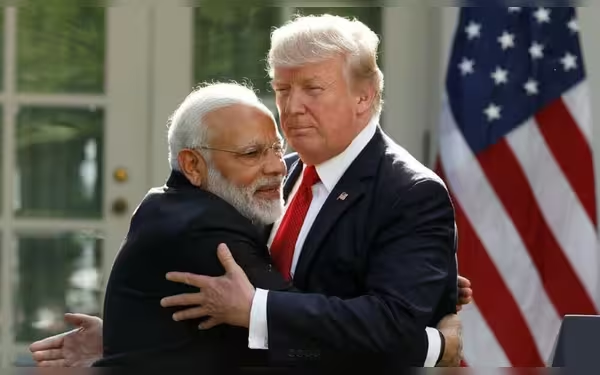Saturday, November 16, 2024 09:32 PM
Trump Labels Modi a Total Killer in Controversial Podcast
- Trump calls Modi a 'total killer' during podcast.
- Expresses admiration for Modi as a strong leader.
- Comments spark debate on political language.
 Image Credits: tribune.com.pk
Image Credits: tribune.com.pkDonald Trump refers to Indian PM Modi as a 'total killer' in a podcast, igniting discussions on political language and U.S.-India relations.
In a recent podcast appearance, former U.S. President Donald Trump made headlines by referring to Indian Prime Minister Narendra Modi as a "total killer." This statement came during a discussion with comedian Andrew Schultz, who hosts a popular podcast with millions of listeners. Trump's comments have sparked a wave of reactions, highlighting the complex relationship between the United States and India, especially in the context of international politics and security.
During the podcast, Trump expressed his admiration for Modi, stating, "He’s a friend of mine." This remark indicates a level of camaraderie between the two leaders, despite the controversial nature of his choice of words. Trump elaborated on their relationship by mentioning, "We had a couple of occasions where somebody was threatening India." This suggests that Trump views Modi as a strong leader who takes decisive action in the face of threats.
The phrase "total killer" is particularly striking and raises questions about the implications of such language in political discourse. While Trump may have intended to convey strength and decisiveness, the choice of words can be interpreted in various ways. Critics may argue that such language is inappropriate for a former president, while supporters might see it as a testament to Modi's leadership style.
As the political landscape continues to evolve, statements like Trump's remind us of the intricate dynamics between world leaders. The relationship between the U.S. and India is crucial, especially in areas such as trade, defense, and counter-terrorism. Understanding these interactions is essential for grasping the broader implications for global politics.
Trump's comments about Modi serve as a reminder of the powerful influence that language can have in politics. As citizens, it is important to critically evaluate the statements made by leaders and consider their potential impact on international relations. The world is watching, and how leaders communicate can shape perceptions and policies for years to come.













